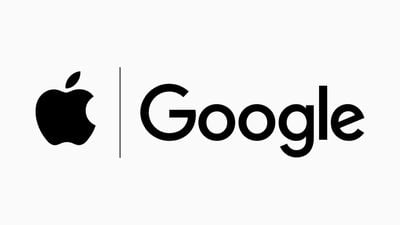Apple and Google today announced a joint effort that will see them using Bluetooth technology to help governments and health agencies reduce the spread of the COVID-19 virus around the world.

Apple says that user privacy and security will be central to the design of the project. Participation will be opt-in, and privacy, transparency, and consent are "of the utmost importance of this effort."
Since COVID-19 can be transmitted through close proximity to affected individuals, public health officials have identified contact tracing as a valuable tool to help contain its spread. A number of leading public health authorities, universities, and NGOs around the world have been doing important work to develop opt-in contact tracing technology. To further this cause, Apple and Google will be launching a comprehensive solution that includes application programming interfaces (APIs) and operating system-level technology to assist in enabling contact tracing. Given the urgent need, the plan is to implement this solution in two steps while maintaining strong protections around user privacy.
Starting in May, Apple and Google will release APIs that enable interoperability between Android and iOS devices using apps from public health authorities. These apps will be available for users to download from the iOS App Store and Google Play.
Contact tracing can help slow the spread of COVID-19 and can be done without compromising user privacy. We’re working with @sundarpichai & @Google to help health officials harness Bluetooth technology in a way that also respects transparency & consent. https://t.co/94XlbmaGZV — Tim Cook (@tim_cook) April 10, 2020
In the coming months, Google and Apple will work to enable a broader Bluetooth-based contact tracing platform by building this functionality into their underlying platforms. Apple says that this solution is more robust than an API and will allow more individuals to participate, if they choose to opt in, and it will enable interaction with a broader ecosystem of apps and government health authorities.
All of us at Apple and Google believe there has never been a more important moment to work together to solve one of the world’s most pressing problems. Through close cooperation and collaboration with developers, governments and public health providers, we hope to harness the power of technology to help countries around the world slow the spread of COVID-19 and accelerate the return of everyday life.
All information about the work being conducted by Apple and Google will be openly published and built in consultation with interested stakeholders. Initial details on the contact tracing technology are available on Apple's new webpage for the feature, which has links to technical documentation on Bluetooth specifications, cryptography specifications, and the framework API.
TechCrunch has specific details on how the tracking procedures will work. A random, rotating identifier will be assigned to a person's phone, and it will be transmitted via Bluetooth to other nearby devices.
The identifier, which rotates every 15 minutes and has no personally identifiable information, will pass through a relay server that can be run by health organizations worldwide. The list of identifiers a person has been in contact with doesn't leave the phone unless the user explicitly decides to share it. Users that test positive will not be identified to other users, Apple or Google.
All identification matching is done on device, allowing users to see within a 14-day window, whether their iPhone has been near the device of a person who has self-identified as having tested positive for COVID-19. Users who are notified that they have been exposed will then receive steps on what to do through a public health app.
Apple and Google are not using any location data for the tracking feature, including from the users who report being positive. The tool is meant to determine not where affected people have been, but rather if they've been around other people so that those people will know to self isolate due to the exposure.
Note: Due to the political or social nature of the discussion regarding this topic, the discussion thread is located in our Political News forum. All forum members and site visitors are welcome to read and follow the thread, but posting is limited to forum members with at least 100 posts.




















